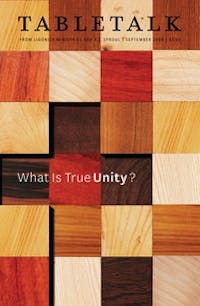
Request your free, three-month trial to Tabletalk magazine. You’ll receive the print issue monthly and gain immediate digital access to decades of archives. This trial is risk-free. No credit card required.
Try Tabletalk NowAlready receive Tabletalk magazine every month?
Verify your email address to gain unlimited access.
Unity matters. However, so does diversity. Indeed, unity and diversity unite in the very nature of God. God is three persons united in one essence. The world around us fails to see how God’s creation reflects the Trinity, and it always therefore either veers toward the imposition of the one or the disintegration of the many. It either blurs or destroys distinctives in the first case, or in the second, it fragments because, in the words of T.S. Eliot, the center cannot hold. It either dies the death of a single tone, or death by cacophony.
As such, we ought to celebrate both unity and diversity, the one and the many, three persons and one essence. God, after all, does the same. The God we worship, God in three persons, knits together the church as one body. The God we worship calls out a people where there is no more Jew or Greek. Most importantly of all, He unites us with Himself through the atoning work of His Son. On the other hand, our God is likewise the God of divisions. Even as far back as the garden of Eden we see God at work dividing. He divided day and night, land and water, man and animal. And each day He saw what He had done, both creating and dividing, and called it good.
That division hit its apex also in the garden. There God promised another division when He spoke to the serpent: “I will put enmity between you and the woman, and between your offspring and her offspring” (Gen. 3:15). This same division comes to its ultimate fruition at the end of all time when Jesus will separate the sheep and the goats for all eternity.
Even as the serpent, from that time forward, has been busy trying to sow division among the people of God in order to destroy the unity we enjoy in the faith, so he has been busy trying to blur the chasm that separates the two seeds. He has encouraged the seed of the serpent to see themselves as God’s children when they are not. He has encouraged the seed of the woman to see themselves as at peace with all men when we are not. He has encouraged us to forget the war and to forget that those who walk among us outside the kingdom are not our kin but our enemies. Unity with them is, according to God’s judgment, an abomination.
It may well be that the worst fruit of this confusion is simply a blurring of our calling. Because we fail to see the great divide between sheep and goats, we look at the world as a neutral place. Worse still, we look at our own telos, or purpose, in neutral terms. We measure success in our lives by the same standards as those outside the kingdom, seeing our faith as something we add to our lives rather than seeing our faith as our lives. We are, in a word, worldly. We who are called to walk by the Spirit too often are one flesh with the world. We deny that we have been called out, set apart — that we are to be separate from the world, to be holy. We refuse to follow the command of the Captain of our army who told us to set aside the petty concerns of the world and to seek first the kingdom of God and His righteousness.
We will not seek first the kingdom of God until we come to realize that this kingdom is at war with the kingdom of men. God declared war in the garden in response to the attack of the serpent. At Calvary our Lord won the definitive victory, having His heel bruised even as He crushed the serpent’s head. Since Jesus walked out of His tomb victorious, our calling has been to be about the mop-up operation. He has already overcome the world, and so we, being of good cheer, go and make the victory known. We bring heaven down to earth by doing His will here as our spiritual fathers do His will there.
Of course, the weapons of our warfare are not carnal. Of course, we are called to love our enemies. Of course, we are to seek, as much as is possible, to live in peace and quietness before all men. Such does not mean, of course, that we are not called to wage war. Such does not mean that we have no enemies. Such does not mean that all men are content to live in peace and quietness with us. We love our enemies by waging war. Our very peace and quietness rattles them like so much artillery bombardment. Indeed, we lose the war precisely when we lose our peace. And in turn, we fail to enjoy peace when we cease to wage war.
We who have been called out are different from the world. Our loyalty is toward another King, and our citizenship is in another kingdom. We, His body, are united together. But we are divided from the rest of the world by a chasm as wide as the east is from the west and as thin as a scarlet thread. We are one, and we are promised this victory parade (from Wm. How’s “for all the Saints”):
From earth’s wide bounds, from ocean’s farthest coast, through gates of pearl streams in the countless host, singing to Father, Son and Holy Ghost, Alleluia! Alleluia!
